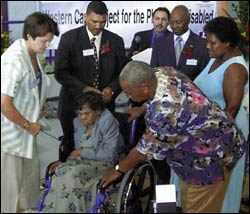Wheelchair project rolls out hope on Cape Flats
14 July 2003
Mobility aid: Key partners in the Western Cape Physically Disabled Project include (from left) UCT's Merle Futter (physiotherapy), Marius Fransman (local MEC for Social Services), Andries de Jongh (AllPay Western Cape's general manager), Israel Skosana (ABSA), Vincent Carelse (Lotus River Community Forum), helping Jean Heuwel into a wheelchair, and her daughter, Doris Heuvel.
During her first week of research in Lotus River a community leader introduced PhD student and senior physiotherapy lecturer Merle Futter to the rival gang leaders. Members of the Lotus River Community Forum considered this meeting essential for safety reasons as she needed to drive a Kombi loaded with wheelchairs and assistive devices in the area to reach the homes of the physically disabled. Four months later two were dead and three were critically injured in a gang fight.
But despite the pervasive sense of violence that hangs like a pall over similar Cape Flats communities, many UCT academics like Futter are notching up startling successes in their community-based projects. Her PhD research is specifically about social barriers that exclude people with physical disabilities from leading a full life in the community.
Working in these conditions is not new to Futter. She completed her masters degree in Manenburg and has worked so intensively in Lotus River over the past ten months that she has become an accepted part of the community.
Futter's aim, which was born from the foundation of her PhD research, was to get wheelchairs to as many disabled people in this under-resourced community as she could, teach people how to master these and ensure that access was provided to homes in the form of concrete ramps.
Her quest began in October last year after she saw the plight of disabled people at the Lotus River Day Hospital.
"I became aware of the magnitude of the problem of mobility and transport and what a detrimental affect it had on the quality of their lives. Some had not been able to leave their homes for 12 years," she commented.
Others, who required medical attention for diabetes or hypertension, were unable to attend the clinic. Some who had been issued with walking aids from clinics and hospitals could not use these as their houses were too small.
Her efforts culminated in the recent launch of the Western Cape Physical Disability Project (WCPDP), a collaboration between UCT's physiotherapy division, the Department of Social Services and Poverty Alleviation and AllPay Western Cape (the company that pays out social grants). Generous donations for funding the initial operational costs were also received from the Ackerman Family Educational Trust and the Constantia Rotary Club.
To date 71 wheelchairs have been issued in Lotus River. Crutches, walking sticks and frames, bath boards, grab bars and other functional aids have been given to a further 56 disabled people. But it was not a case of simply supplying equipment. Futter visited the homes of each of the community's 88 disabled people receiving permanent disability grants to assess their mobility and functional needs. Some lived in third and fourth floor flats, others in areas too sandy to propel wheelchairs.
Concrete pathways have thus been built from the front and back doors of 28 homes. Ramps have also been built to provide access to the homes and from the pavements to the roads.
The project has seen previously house-bound people take to the streets again in sturdy wheelchairs, built to traverse the rough terrain of sand and rubble that make up many of the community's frequented routes. They haven't just become mobile; they've become visible participants in their communities, able to attend church, shops and clinics.
The project has already been extended to other under-resourced communities in the Western Cape. Wheelchairs have been provided to another 75 disabled people from areas as far afield as Khayelitsha, Ocean View, Wellington, Hopefield, Caledon, Malmesbury, Picketberg, Clanwilliam and Hawston. A further 100 requests are being processed from other peri-urban and rural areas in the province.
"As the project has grown too large for one person to assess all the disable people, physiotherapists, occupational therapists and orthopaedic sisters working at the clinics and hospitals have been invited to refer the mobility needs of those with whom they have contact," Futter added.
But the circle of benefit has widened even further. The company that manufactures the wheelchairs employs disabled people from the community to assemble these, providing employment where few opportunities exist. The concrete pathways and ramps have been constructed by builders living in the community as a means of employment.
"It's a partnership on many levels," Futter concluded.
 This work is licensed under a Creative Commons Attribution-NoDerivatives 4.0 International License.
This work is licensed under a Creative Commons Attribution-NoDerivatives 4.0 International License.
Please view the republishing articles page for more information.
Related
Cape Town’s wildflowers: six key insights from a new checklist
19 Feb 2026
Republished










